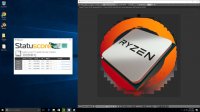Correct me if I am wrong, but doesn't the CPU you used in your test have 12 cores, 24 threads? I am asking because in your analysis you used Ryzen's number of threads as 8, while it should have probably been 16.
Also the fact that Ryzen 16 thread CPU matches a similarly clocked 6900k which also has 16 threads would mean that at least in this benchmark they have similar IPC per core.
Yes, each CPU in my computer has 12 cores and 24 threads. It's got 2 CPU's. Also, from what I've been told the Core i7 6900K is pretty much all cores locked at 3.5GHz during the benchmark, indicating that it's IPC is just a smidge behind Ryzen.
Not bad for a company with a tiny fraction of Intel's money.
![[H]ard|Forum](/styles/hardforum/xenforo/logo_dark.png)





